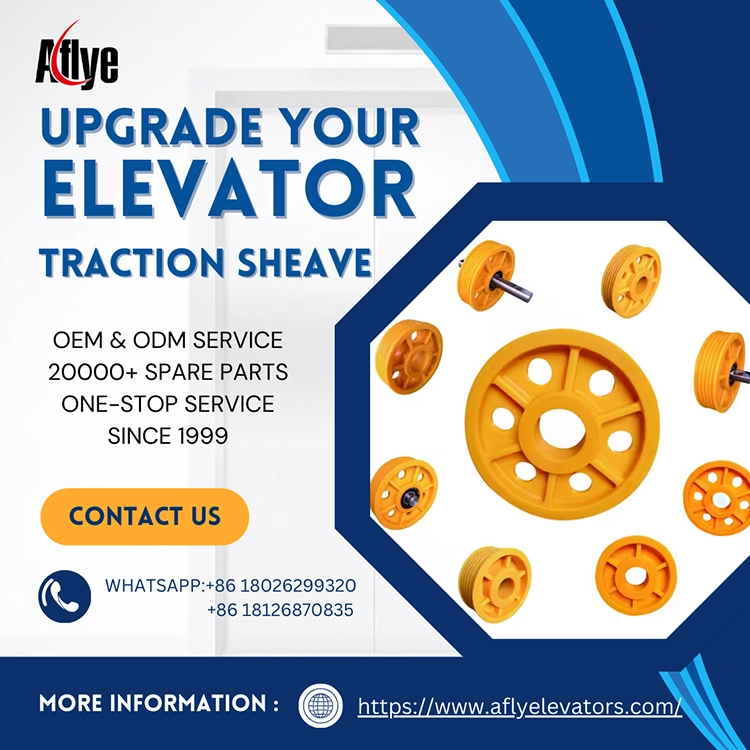How to Replace an Elevator Traction Sheave Properly?
In the elevator traction system, the traction sheave is one of the core components that drive the elevator up and down. It creates traction through friction with the wire ropes. Once the traction sheave becomes severely worn, it can cause vibration, rope slippage, inaccurate leveling, and even safety risks.
Therefore, correctly replacing the traction sheave during elevator maintenance or modernization is a key step to ensuring safe operation.
Today, A-FLY Elevator & Escalator Parts Supplier will explain the important factors that must be considered when replacing a traction sheave.

I. Confirm the Specifications and Compatibility of the Traction Sheave
The first step in replacing a traction sheave is ensuring that the new sheave matches the original elevator design.
Specifications that must be confirmed include:
Number of rope grooves (3, 4, 5, 6, etc.)
Groove angle (typically U-type or V-type)
Groove size (matched with 8mm / 10mm / 12mm / 13mm wire ropes)
Sheave outer diameter
Shaft hole size and keyway position
Compatible traction machine model
Different brands, speeds, and capacities use different sheave specifications. Choosing the wrong model can lead to rope slippage or traction failure, creating safety hazards.
II. Inspect the Wear Condition of the Wire Ropes
The traction sheave and wire ropes wear each other, so their condition must be evaluated together.Check for:
Broken wires
Rope diameter reduction
Severe surface wear
Mismatch between rope and groove
If the ropes are in poor condition but only the sheave is replaced, the new grooves will wear rapidly and traction will decrease.
Best practice: Evaluate whether both the sheave and wire ropes should be replaced together based on wear.
III. Confirm Groove Wear Level and Material Selection
The most critical part of the traction sheave is the rope groove, as traction relies entirely on its surface.You must confirm:
Whether the rope grooves are worn flat
Whether groove depth is below standard
Whether materials meet strength and wear-resistance requirements
Whether the groove machining is precise
Groove wear exceeding 30% significantly reduces friction and can cause rope slippage and leveling inaccuracy.
Different elevators use different materials such as cast iron, ductile iron, steel, or hardened materials.
IV. Ensure Proper Installation Alignment and Concentricity
Improper installation is one of the most common causes of elevator vibration, abnormal noise, and rope jumping.
During installation, check:
Condition of traction sheave bearings
Concentricity between sheave and traction machine
Correct keyway fit
Secure tightening of mounting bolts
Poor concentricity increases groove wear, causes machine vibration, and reduces overall system lifespan.
V. Confirm That the Traction Capacity Meets Design Requirements
Different elevator loads and speeds require different traction capacities.
Improper selection may result in:
Difficulty starting
Frequent rope slippage
Abnormal motor load
Unstable up/down movement
Pay special attention to:
Large-capacity elevators
High-speed elevators
Hospital or freight elevators
Old elevator modernization
The new sheave must meet traction calculation requirements, including proper groove angle, depth, and material.
VI. Perform Thorough Test Runs and Safety Checks After Replacement
The traction sheave is a core safety component. After replacement, strict testing is required:
No-load running test
Full-load test
Braking test
Leveling accuracy test
Overload protection check
Up/down acceleration/deceleration verification
Any abnormal condition must be adjusted immediately.
VII. A-FLY Provides High-Quality Traction Sheaves and Matching Solutions
As a professional A-FLY elevator & escalator parts supplier, A-FLY offers a full range of traction sheave products, including:
Rope groove sizes (8/10/12/13/16mm)
Multi-groove sheaves (3–8 grooves)
Compatible models
Custom machining services
A-FLY traction sheave advantages:
High-strength, long-life materials
High-precision machined grooves
Excellent compatibility
Matching wire ropes, bearings, and traction machine parts
Fast global shipping
Whether for modernization, maintenance, or elevator installation projects, A-FLY provides stable and reliable traction solutions.
VIII. Conclusion: Replacing a Traction Sheave Is Not Just “Changing a Wheel”
It involves traction force, safety, wire rope life, and overall system stability.
Only with the correct model, proper installation, and thorough testing can the elevator traction system operate smoothly and safely.
Choose A-FLY to make elevator traction more reliable, more durable, and safer.

